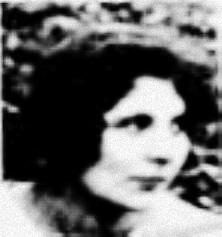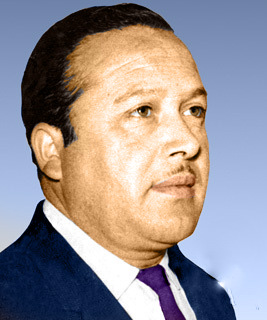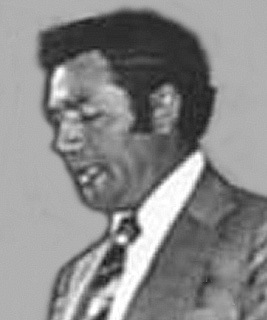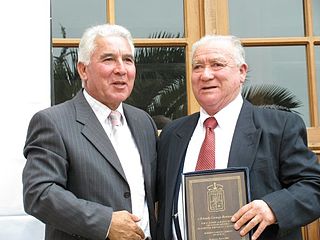
The Pichilemu City Council (Spanish : Concejo Municipal de Pichilemu) is the legislative body of the City of Pichilemu. The council meets in Pichilemu City Hall.

The Pichilemu City Council (Spanish : Concejo Municipal de Pichilemu) is the legislative body of the City of Pichilemu. The council meets in Pichilemu City Hall.
The City Council consists of seven members, including the Mayor. [1] City council members and the Mayor are chosen by elections every 4 years. The city council is presided by the Mayor.

The Pichilemu City Hall served as the city's administrative headquarters. It was constructed from 1891 until May 6, 1894. [2] [3]
The building was located in the Ángel Gaete street, [4] in a terrain of 1,660 square metres (17,900 sq ft) that descends suddenly from the street level. It was conformed by a 2-floors building, a zócalo, a complementary construction (260 square metres (2,800 sq ft)) and a yard. The yard serves as car parking for the municipality trucks, has a store and the corral municipal. [3]
The building was not constructed for that purpose, and worked as four separate parts rather than one unit. [3]
The Pichilemu City Hall was scheduled to be renovated in 2011, by the Government of O'Higgins Region. [5] According to the Municipality of Paredones, the Pichilemu City Hall "will be completely repaired." [6] Mayor of Pichilemu Roberto Córdova said on a Pichilemu City Council meeting that the new City Hall will be constructed with the earthquake reconstruction funds, and it was expected that by late 2011, the construction work will begin. [7]
The Municipalidad de Pichilemu building was demolished between December 2011 and January 2012. No construction work has begun as of March 2012.

Agustín Ross Cultural Centre, previously known as Casino Ross, is the cultural center of the city of Pichilemu in Libertador General Bernardo O'Higgins Region, Chile. It was constructed between 1906 and 1909 at the request of politician Agustín Ross Edwards. The structure of the cultural center is very similar to that of the Grand Trianon in Versailles, France.

Colegio de la Preciosa Sangre de Pichilemu, often shortened to Preciosa Sangre, is a coeducational Roman Catholic private state-subsidized day school, serving students in preschool through twelfth grade, located in the commune of Pichilemu, Libertador General Bernardo O'Higgins Region, Chile.

The history of Pichilemu began around the 16th century, when Promaucaes inhabited the modern Pichilemu region. According to Chilean historiographer José Toribio Medina on his book Los Restos Indígenas de Pichilemu (1908), Spanish conqueror Pedro de Valdivia gave Topocalma encomienda, in which Pichilemu was supposed to be, to Juan Gómez de Almagro, on January 24, 1544.

The Mayor of Pichilemu is an elected politician who is the head of the executive branch of government of the commune of Pichilemu, Libertador General Bernardo O'Higgins Region, Chile. The mayor presides over the local city council, composed of six members, and serves as the civic representative of the commune. The mayor is popularly elected in a municipal election, by simple majority. The office is held for a four-year term without term limits.

José María Caro Martínez was a Chilean politician and civil servant. In May 1894, he was unanimously elected as the first mayor of the commune of Pichilemu, with Pedro Nolasco de Mira and Francisco Reyes made second and third magistrate respectively. Caro Martínez had previously served for several years as administrator or llavero of the San Antonio de Petrel hacienda and, between 1891 and 1892, was the Subdelegate of the 13th Subdelegation of San Fernando Department which comprised the district of Cáhuil.

Olga Maturana Espinosa was a Chilean politician born in Santiago. Maturana worked as Councillor of Pichilemu in 1950, and became the first female Mayor of Pichilemu in 1951.

Mario Alejandro Moraga Cáceres is a Chilean politician, who worked as regidor of Pichilemu, O'Higgins Region, between 1967 and 1970. Moraga is popularly known as el Sin Pelos en la Lengua, after the radio program he hosts in Radio Entre Olas.

René Gabriel Maturana Maldonado was a Chilean journalist and the 36th Mayor of Pichilemu, holding the position from his appointment by President Augusto Pinochet Ugarte on 31 August 1984 until his resignation in April 1992.
José Santos Becerra was the fifth Mayor of the commune of Pichilemu, office which he held between September 1912 and May 1915.
Osvaldo Sotomayor Ilabaca was the 15th Mayor of the commune of Pichilemu, office which he held between February and March 1935, for a span of only nine days, under President Arturo Alessandri Palma. Sotomayor's mayoral term is the shortest in the history of Pichilemu, excluding acting mayor Gustavo Parraguez Galarce.

Armando Caroca Rojas was the 20th Mayor of the commune of Pichilemu, office which he held between May 1944 and May 1947. He was succeeded by Carlos Echazarreta Larraín. He also was a regidor of Pichilemu for several terms.
Basilio Sánchez Beguiristáin was a Chilean physician. Between May 1960 and May 1963, Sánchez was the 26th Mayor of the commune of Pichilemu. He was also one of the founding members of the Pichilemu Fire Department and was, for decades, the director of Pichilemu Hospital.

Carlos José Ramón Echazarreta Iñiguez was the 27th and 30th Mayor of the commune of Pichilemu, office which he held between May 1963 and May 1967, and through the early months of the Augusto Pinochet military regime, between September and November 1973. In 1967 he was succeeded by Carlos Rojas Pavez, and in 1973 he was succeeded by Mario Urrutia Carrasco. Echazarreta also was a regidor of Pichilemu for several terms between 1959 and 1973.
Carlos Ignacio Rojas Pavez was the 28th Mayor of the commune of Pichilemu, office which he held between May 1967 and May 1971. For almost three decades, Rojas Pavez worked as the municipal secretary of Pichilemu, and in 1944, along with José Arraño Acevedo and Miguel Larravide Blanco, founded Pichilemu, a newspaper focused in local stories.

Washington Saldías Fuentealba was the 29th Mayor of the commune of Pichilemu, office which he held between May 1971 and September 1973: his term was interrupted by the 1973 Chilean coup d'état, which put General Augusto Pinochet in the power of the country, and who later appointed Carlos Echazarreta Iñiguez as the successor of Saldías. Saldías was also regidor of the commune of Pichilemu between 1963 and 1971, and a founding member of the Club Aéreo de Pichilemu.

Víctor Eduardo Parraguez Galarce was the 32nd Mayor of the commune of Pichilemu, office which he held between 1975 and 1979, after being appointed by the government junta presided by General Augusto Pinochet. Parraguez Galarce is also an agricultural entrepreneur, and had an important role in the committee that prompted the creation of the province of Cardenal Caro, in his home region.

José Lino Vargas Jorquera is a Chilean politician. He was the 33rd Mayor of the commune of Pichilemu, office which he held between 1979 and 1981, after being appointed by the government junta presided by General Augusto Pinochet. The Cardenal Caro Province, of which Pichilemu is the capital, was created during Vargas' term as mayor. He also was a founding member of the Club Aéreo de Pichilemu ; Vargas is an experienced pilot.
Julio Waidele Wolff was the 34th Mayor of the commune of Pichilemu, office which he held between 1981 and 1982, after being appointed by the military government presided by General Augusto Pinochet.
Gustavo Osvaldo Parraguez Galarce is the municipal secretary of Pichilemu, and was the interim Mayor of the commune of Pichilemu three different times, in 1992, 2007, and 2008.

Orlando Cornejo Bustamante was the 37th Mayor of the commune of Pichilemu, office which he held between September 1992 and December 1996, representing the Union of the Centrist Center (UCC). He was the first mayor of Pichilemu to be elected following the Chilean transition to democracy. In 1996 and 2000, he ran again as a candidate in the municipal elections of these years, but failed to be elected in either.